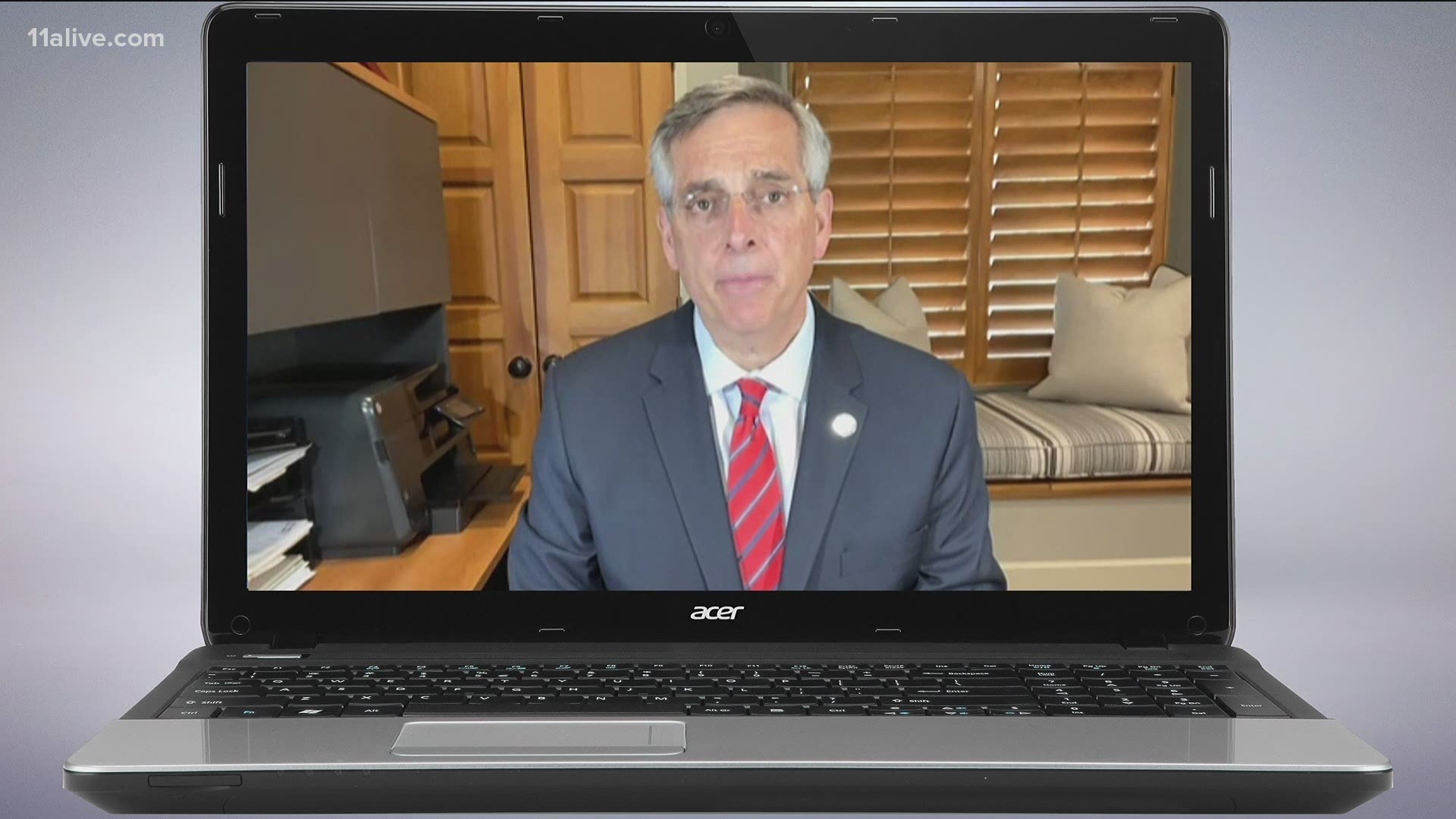ATLANTA — Challenges are piling up against the state as opponents of Georgia's new voting law claim it will negatively affect minority communities and cause voter suppression.
Now Georgia's top election official, Secretary of State Brad Raffensperger, has opened up about the GOP-led legislation signed a few weeks ago by Gov. Brian Kemp.
He sat down with 11Alive on Thursday to give his thoughts on Senate Bill 202 as some are calling for boycotts against Georgia businesses. Many top CEOs have also spoken out about the controversial measure.
"I was not involved in the legislative process," he said. "So I was not talking to Coca-Cola or Delta or any other corporate companies."
"I would have liked to have had the opportunity to hear what their concerns were to address them. I understand what their concerns are now, but those were something that General Assembly should have had under control and obviously they didn’t," he added.
These are some of the highlights of the law:
- Requires an ID number, like a driver’s license, to apply for an absentee ballot
- Cuts off absentee ballot applications 11 days before an election
- Limits the number of absentee ballot drop boxes
- Allows the state to take control of what it calls “underperforming” local election systems
- Disallows volunteers from giving away food and drink to voters waiting in lines
- Revises times for advance voting
- Allows election officials to begin scanning verified ballots on the third Monday before election day
- Requires two Saturday voting days and makes two Sunday voting days optional
- Revises times for runoffs to be held on the 28th day after a general or special primary election
"There’s several reservations I had about a few items in the bill," he said. "There are some very positives, number one positive is that we’re moving away from signature match."
The new law de-emphasizes signatures used in the absentee ballot process and instead requires voters to provide a copy of a Georgia ID.
"I ran in 2018 to move away from signature match and move toward driver license number as your ID along with birthdate - month and year - and that’s what's in the bill. And that's one of the best things that’s in this bill."
Other positive provisions, according to Raffensperger, include moving from an 8-week runoff for federal races to four weeks.
"I also think that expanding early voting period from 16 to 17 days is also solid," he added. "They never should have talked about taking away Sunday voting and I'm glad they have now two days of Sunday voting."
While Raffensperger sees these as useful changes, some people say some of the provisions will impact voters negatively. Those in opposition claim Republicans used baseless allegations of voter fraud to push the bill through.
Several advocacy groups have also filed lawsuits in federal court as they target specific provisions in the law that they say could diminish minority voters' voice.
"This law is voter suppression plain and simple," said Sophia Lin Lakin, deputy director of the ACLU’s Voting Rights Project in a news conference from last month. "Aimed at making it harder for Black and Brown and other historically disenfranchised communities to have a voice in our democracy."
In response to the state law, Atlanta Mayor Keisha Lance Bottoms issued an administrative order Tuesday that she said could help expand access to Atlantans' right to vote.
“The voting restrictions of SB 202 will disproportionately impact Atlanta residents -- particularly in communities of color and other minority groups,” Mayor Bottoms said in a statement. “This Administrative Order is designed to do what those in the majority of the state legislature did not -- expand access to our right to vote.”
One provision within the new election law has caused some political experts to raise an eyebrow. The law will remove the secretary of state as the chairperson of the State Elections Board.
Under the new law, the General Assembly will elect a non-partisan chairperson to lead the state elections board.
"You’re now putting an incredible amount of power on the state election board, far more than it had before with now an unelected board member," Raffensperger explained. "Unaccountable to no one other than the General Assembly. So if a voter is not happy with the decisions that are made who do they hold accountable? Do they call all 180 state representatives, do they call all 56 state senators?"
He said there isn't direct accountability and he believes "in that respect, it’s very short-sighted and it’s not going to work out for Georgians."
Another provision allows the state board to take over local election systems that are “underperforming.”
The next state election will be in 2022. Some political experts believe that people on both sides could use this as an opportunity to drive out their voter bases to the polls.
Watch Raffensperger's full interview below.

